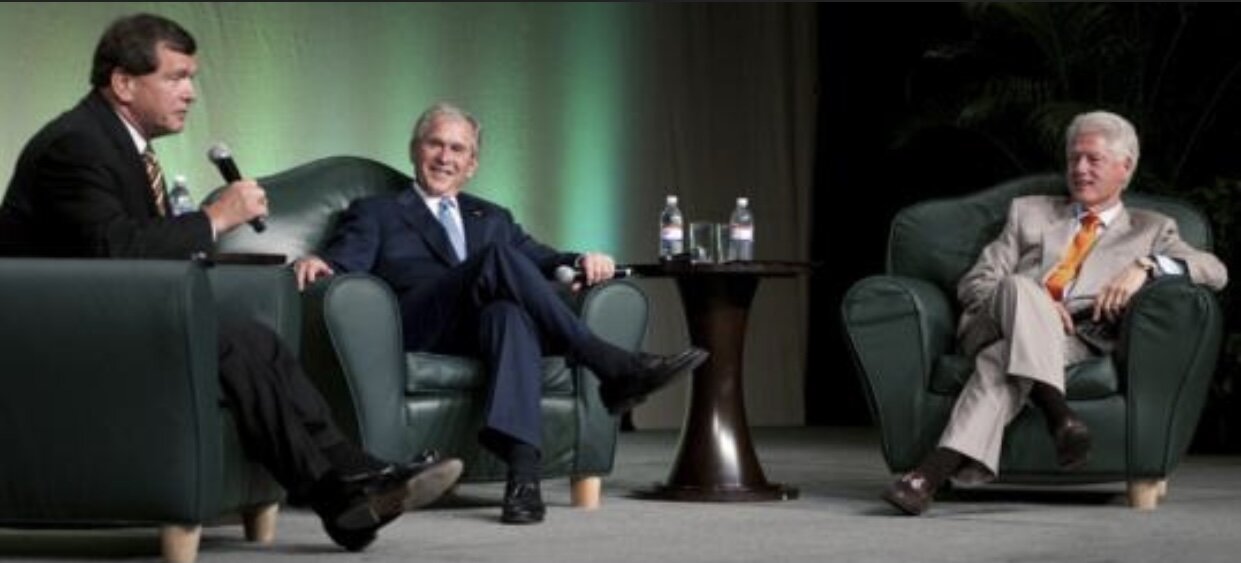During Hillary's tenure at State, IYF received USAID grants to work in Mexico, Mozambique, Senegal, Tanzania, the Kyrgyz Republic, Uganda, Jordan, the Caribbean, the West Bank and Gaza, and Algeria, and to address "good governance" issues worldwide.
In 2012 it also received its first grant directly from the State Department: $1.9 million for work on a Middle East Partnership Initiative. In January 2013, just before Hillary left her post as secretary of state, the International Finance Corporation (IFC) made a $150 million equity investment in Laureate, the first time the development organization had ever done so.
Jim Kim
IFC is part of the World Bank. The head of the World Bank at the time was Jim Kim, a Clinton friend and cofounder of Partners in Health, a partner of the Clinton Foundation.
Isn't it troubling that while Bill Clinton was being paid by a private corporation, that corporation was also benefiting from State Department actions? Isn't it troubling that an affiliate of that corporation is also receiving tens of millions in taxpayer money? Isn't it troubling that this seeming conflict of interest was not disclosed?
Troubling State Department conflict of interest questions hardly end here. But now let us turn the camera to the man behind the podium (and Foggy Bottom).
The link is here.
CHAPTER 7
Podium Economics
WHAT WAS BILL BEING PAID FOR?
Most ex-presidents see the demand for their speechmaking decline as they move farther away from their time in office. The opposite applies to Bill. Indeed, during Hillary's tenure as secretary of state, Bill's speechmaking activity increased and became much more profitable, particularly overseas. In a number of cases, these speeches were paid for by people with an interest in obtaining favors from Hillary.
Does Bill's outsized personality and global popularity really explain his record financial success on the speaking circuit? We have become used to former occupants of the Oval Office making money in their post-presidential years.
Ronald Reagan famously gave two speeches for $2 million in Tokyo following his retirement from office. George H. W. Bush gave lectures and joined corporate boards for firms like the investment giant the Carlyle Group. But no one comes close to Bill Clinton.
The really troubling thing about Bill's speeches is the apparent correlation between his fees and Hillary's decisions during her tenure as secretary of state. The timing of the payments, the much higher than average size of some of them, and the subsequent actions taken by Hillary raise serious questions about just what those who underwrote these exorbitant fees were actually paying for.
As noted earlier, Hillary infamously claimed she and Bill were “dead broke" when they left the White House. So while Hillary went to the US Senate, Bill hit the lecture circuit. In 2001 he gave thirty-nine speeches overseas and twenty in the United States.
In the following seven years, the Clintons pulled in a stunning $109 million. As Clinton's presidency receded into the past, his income from speeches, especially big paydays from overseas speeches, declined. But when Hillary became secretary of state in 2009, those high-paying over- seas speeches ramped up dramatically.
Bill's three best years securing speaking fees over $250,000 occurred while Hillary was at State. In fact, of the thirteen Clinton speeches that fetched $500,000 or more, only two occurred during the years his wife was not secretary of state.
TD Bank, a Canadian financial institution, has paid Bill more than any other financial institution for lectures. More than Goldman Sachs, UBS, JPMorgan, or anyone on Wall Street. TD Bank paid Bill $1.8 million for ten speeches over a roughly two-and-half-year period from late 2008 to mid-2011. Moreover, these payments came at a crucial time, as Hillary wrestled with a controversial decision of enormous financial interest to the bank.
Beginning in 2008 TransCanada Corporation sought US government approval for the $8 billion, 1,660-mile-long Keystone XL pipeline, which was designed to transport 900,000 barrels a day from Alberta's oil sands to Gulf Coast refineries in Port Arthur, Texas. Because the project crossed an international border, authority for granting a presidential permit of approval rested with the US secretary of state.
TD Bank had never paid Bill for a speech until the pipeline project began snaking its way through Washington. It was late 2008 and Keystone XL permits had just been submitted to Washington. Hillary had lost the Democratic nod for the White House, but she was still a powerful US senator. Capitol Hill Republicans were generally supportive of energy projects like Keystone XL. If there was going to be opposition, it would likely come from liberal Democrats.






